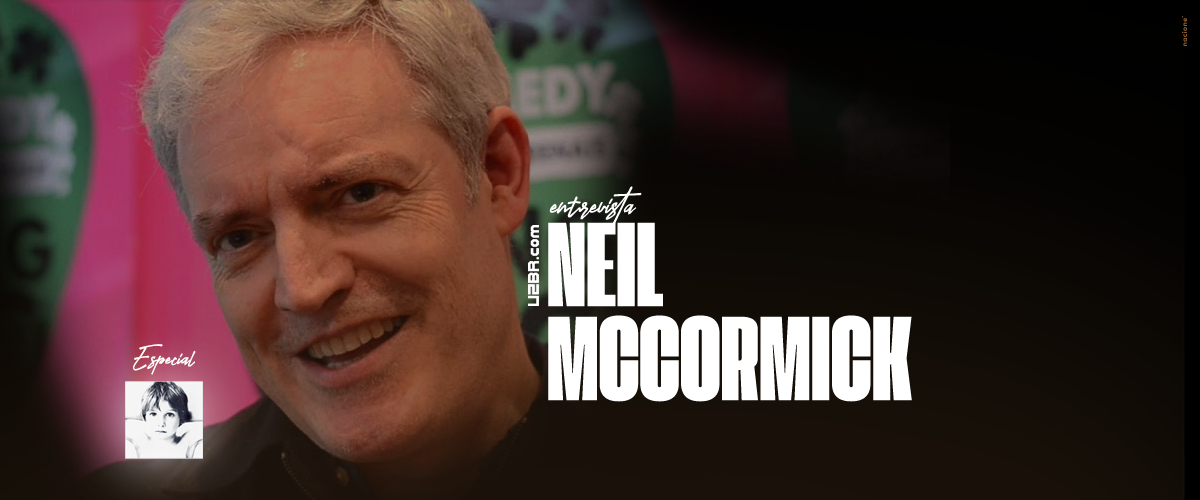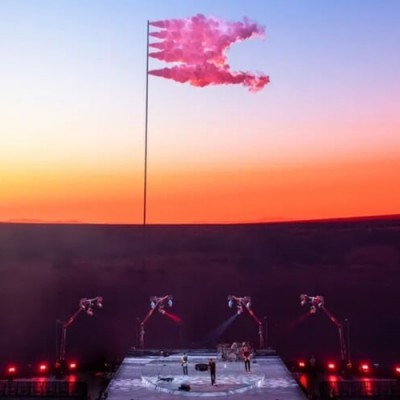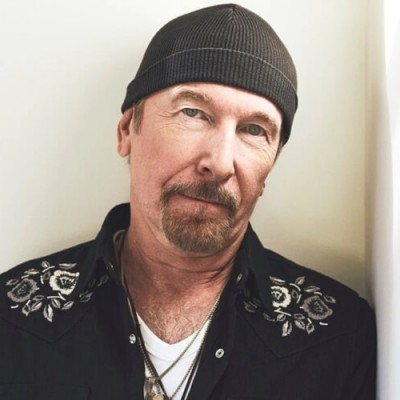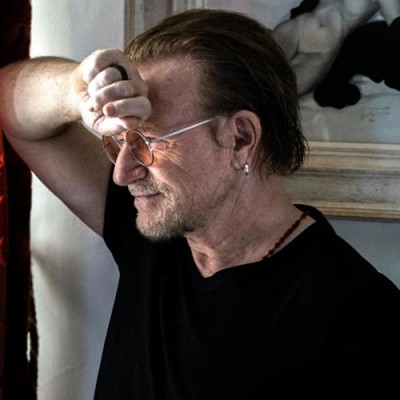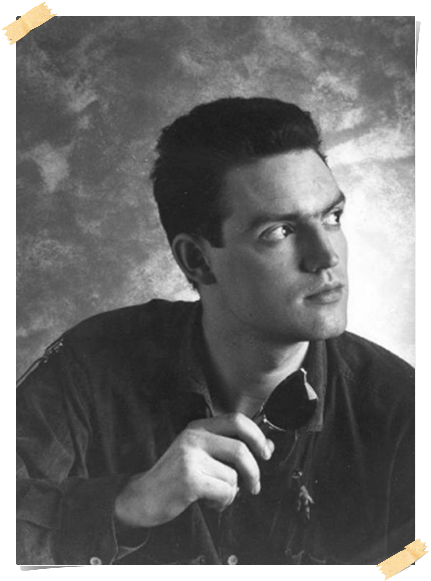
Se perguntassem para alguns fãs do U2 se eles desejavam poder trocar de lugar, por um período que fosse, com alguém que faz parte da história da banda, o nome escolhido por muitos para ser vítima desta aventura seria Neil McCormick.
Neil nasceu na Inglaterra em agosto de 1961. Na infância, se mudou com os seus pais para a Escócia e, posteriormente, no início da sua adolescência, juntamente com eles e com seus irmãos – Ivan e Stella – passaram a viver na capital irlandesa, Dublin.
Os irmãos McCormick foram matriculados pelos seus pais na escola que até então apresentava a visão mais progressiva dentro da sociedade irlandesa: a Mount Temple Comprehensive School, onde haviam muitos outros alunos que como eles eram apaixonados por música. E como muitos já sabem no mural do lugar apareceu um certo anúncio de um aluno que queria montar uma banda. Ele tinha a bateria, a vontade e o talento, mas precisava do resto.
Ivan se juntou aos garotos que compareceram a cozinha do bairro de Artane, lar de Larry Mullen e de sua família. Estavam presentes além de Ivan e do garoto dono da casa, Paul David Hewson (que era colega de Neil), David e Dick Evans, Adam Charles Clayton (que era colega de classe de Stellla McCormick) e Peter Martin.
Ivan entrou para a banda, Stella foi convidada a participar como backing vocal nas duas primeiras apresentações do grupo, que foi batizado como Feedback. Porém, apenas depois de apenas dois meses, ele acabou sendo dispensado em uma ligação por Adam Clayton que disse que ele não teria idade para entrar no pub onde a banda faria um dos seus primeiros shows. Ele tinha apenas 13 anos.
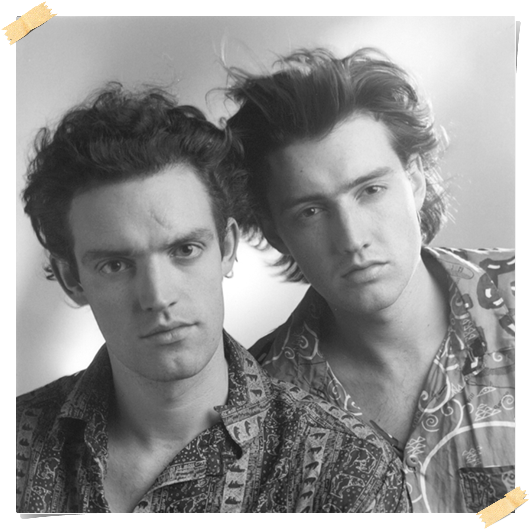
Dois anos depois, os irmãos McCormick montaram a sua própria banda chamada Frankie Corpse & The Undertakers, que depois mudou o seu nome para The Modulators. Ao mesmo tempo, Neil se tornou membro da equipe responsável pela lendária e importantíssima revista Hot Press que era responsável por movimentar toda a cena musical na capital irlandesa, destacando nomes locais e também vindo de outras partes do mundo. Neil pôde ver os seus amigos de escola se tornarem o U2 e aparecerem na capa dela apenas poucos anos depois da dispensa do seu irmão.
Porém, o seu próprio sonho de rockstar permanecia vivo e passou muito perto de ter se tornado realidade. Depois das duas bandas citadas acima e também da Yeah! Yeah!, Neil e Ivan conseguiram assinar um contrato com uma gravadora e lançar o seu primeiro single agora atendendo como Shook Up!. A banda durou de 1985 a 1988, até que Neil acabou por perceber que na realidade o seu grande papel no cenário musical estava no backstage e ele passou a se dedicar inteiramente ao jornalismo musical.
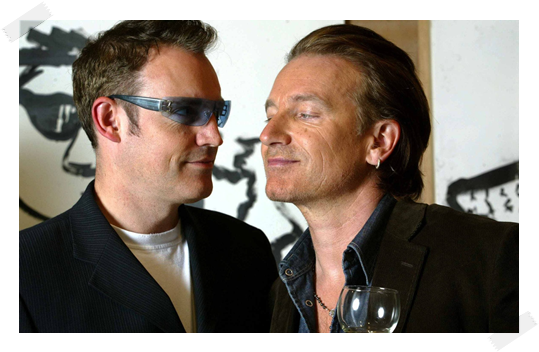
A amizade com seus amigos famosos se manteve ao longo de todas as idas e vindas da vida de Neil, ele viu o U2 se tornar a maior banda do planeta no final dos anos 80, viu as mudanças de direção nos anos 90, viu Bono se ingressar em lutas por direitos sociais, casamentos e nascimentos, se mantendo como uma verdadeira testemunha ocular, um confessor, um conselheiro e um ouvinte atento.
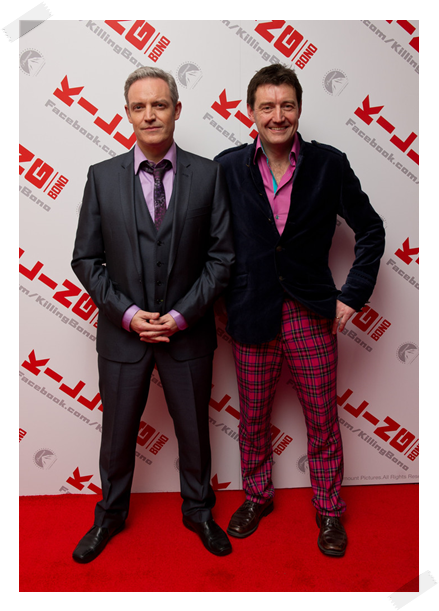
Em 2004, já estabilizado como crítico no The Daily Telegraph, depois de ter passado pela revista britânica GQ, Neil lançou um álbum solo Mortal Coil, sob o pseudônimo The Ghost Who Walks. Mas essa definitivamente não foi a obra mais famosa feita por ele naquele ano. O livro Killing Bono chegou às livrarias contanto de forma muito bem-humorada toda a trajetória de Neil como um “impostor”, alguém que queria ter vivido a vida que Bono tinha até aquele momento. Uma narrativa muito leve, divertida e repleta de pequenos detalhes sobre o passado do U2, mas especialmente sobre a vida de alguém que como muito de nós cresceu apaixonado pelo mundo da música, preocupado com “o que vou ser quando crescer” e com amigos que algumas vezes parecem ter uma vida muito melhor do que a sua. Em 2011, o livro ganhou as telas do cinema, com um filme de mesmo título. Ivan, o irmão dispensado, foi o responsável pela trilha sonora. Mais recentemente, em 2018, a obra ganhou os palcos do teatro em Soho, em Londres.
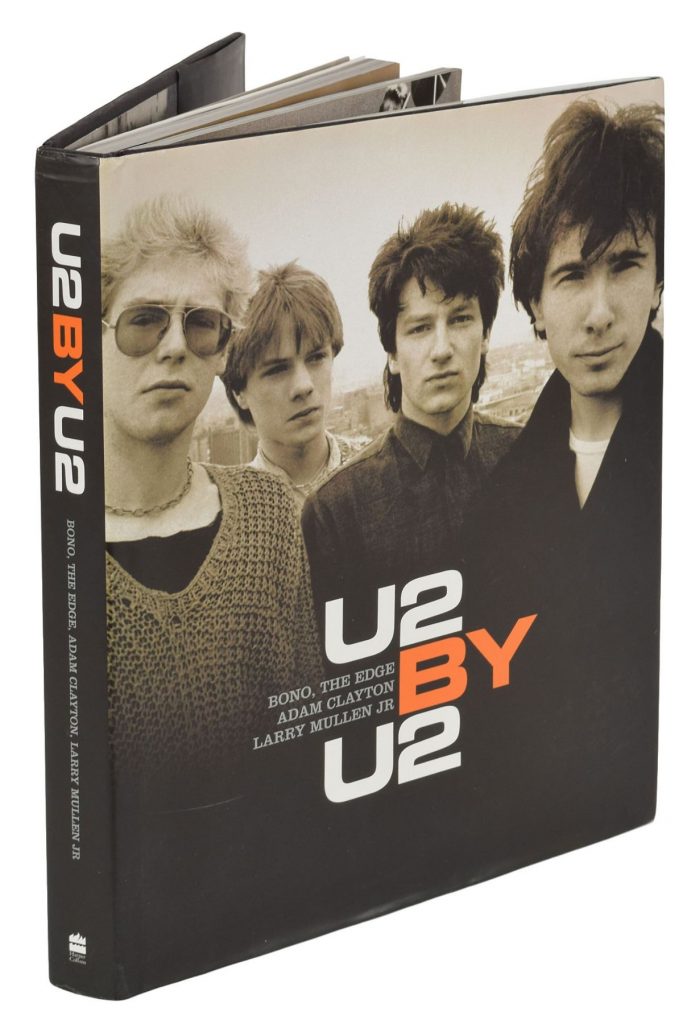
Em 2006, no momento de comemoração de 30 anos de carreira do U2, Neil foi responsável por escrever a biografia da banda U2 by U2. Uma verdadeira enciclopédia para os fãs da banda, especialmente os que queriam conhecer os passos que haviam trazido os irlandeses até aquele momento.
Em 2017, Neil lançou seu primeiro romance ficcional Zero, que foi feito através de financiamento coletivo. O livro mais uma vez tem o cenário musical como pano de fundo, apresentando um personagem envolvido dentro dessa realidade atual que lida com a cultura em diversos meios diferentes, e mais um produto do que realmente um estilo de vida como foi na adolescência e juventude do autor.
Atualmente, Neil se mantêm como parte da equipe de cultura do The Telegraph e também um convidado recorrente em parcerias com a BBC britânica.
Conversamos com Neil para mais uma de nossas entrevistas integrantes do especial de 40 anos do lançamento de Boy. Em nosso bate-papo, Neil nos contou suas lembranças dos primeiros dias do U2, os primeiros shows, curiosidades, reflexões sobre a música e seu trabalho. Confira a seguir!
Você esteve presente em algum dos primeiros ensaios da banda? Como eles eram?
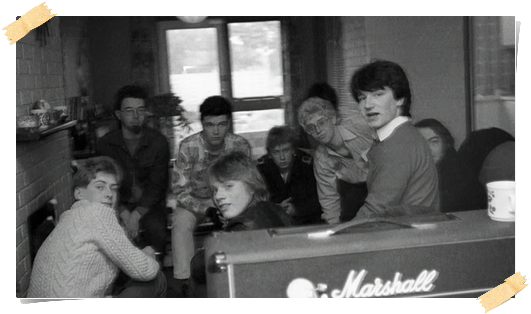
Eu estive em alguns ensaios. Não me lembro muito deles, exceto de ficar impressionado com a sensação de barulho e propósito vindo da sala de música. Estava decorado com carpete em placas laranja, pelo que me lembro. Meu irmão Ivan estava naqueles primeiros ensaios, e ele se lembra de um incidente interessante de Bono (ou Paul Hewson como ele era chamado na época) encorajando todos a tocarem como se estivessem tentando sugar a música de seus instrumentos. Portanto, nada mudou muito.
Quais as suas lembranças do primeiro show do U2 como Feedback no Mount Temple?
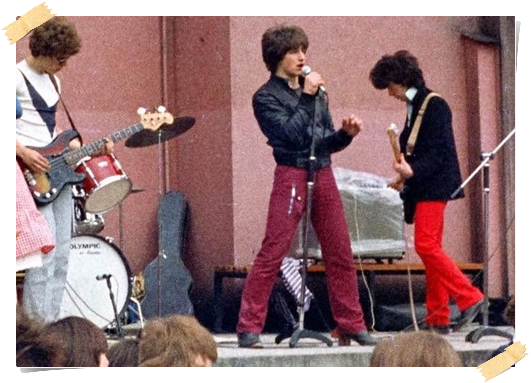
Isso mexeu com minha minúscula mente adolescente. Já escrevi sobre isso muitas vezes. Era um grande ginásio, onde estávamos fazendo uma espécie de concurso de talentos. Eu estava fazendo uma peça de comédia que havia escrito com alguns de meus amigos sobre nossos professores. A gente ia se apresentar por último. O Feedback aconteceu antes de nós, tocando em um palco feito de quatro mesas coladas com fita adesiva. Eles pareciam ótimos. Eram apenas os quatro, a mesma formação do U2 agora. Eles começaram o show com "Show Me The Way" de Peter Frampton e foi um momento de mudança de vida, para eles ... e para mim. Aquele acorde elétrico de abertura de Edge disparou pela sala, a banda entrou em ação e a história foi feita. Lembro que Bono tinha um violão, mas ele parou de tentar fingir que estava tocando, em vez disso, pegou o pedestal do microfone e caminhou pelo palco com suas botas pontudas gritando "Eu quero você ... me mostre o caminho!" Havia jovens colegiais na sala que, como a maioria de nós, nunca tinham visto uma banda de rock ao vivo antes. Eles correram para a beirada do palco e começaram a gritar e berrar, agindo como um fandom histérico, como tínhamos visto na TV. Foi incrivelmente excitante. Eles tocaram três músicas, incluindo "Bye Bye Baby" de Bay City Rollers, e talvez tocaram uma delas de novo porque todos estavam gritando muito. Fiquei tão emocionado que me recusei a continuar e fazer nossa peça. Eu praticamente decidi formar minha própria banda naquele exato momento.

Por que você e seu irmão decidiram montaram uma banda na época? Como era a relação com o U2?
A música sempre foi uma grande parte de nossas vidas. Ivan tocou guitarra e esteve envolvido nos primeiros ensaios do Feedback. Eu queria ser ator, mas depois que vi o U2 decidi que seria uma estrela do rock. Coisas de adolescente. Nosso relacionamento com o U2 era muito amigável. Eles foram encorajadores e Bono foi um pouco como um mentor para nós, e se tornou um bom amigo para mim naquele período por meio de nossa obsessão pela música, e particularmente o início do punk. Isso era considerado ultrajante na Irlanda, e havia apenas alguns de nós que gostávamos disso. Bono é cerca de um ano mais velho que eu, Larry é um ano mais novo e essas diferenças de idade contam muito na adolescência. Eu olhei para um e para o outro! Dave (The Edge) era um amigo da classe. Adam estava um pouco mais distante, porque ele tinha sua própria vibe. Mas, essencialmente, éramos todos adolescentes obcecados por música, e um tipo de música que era desaprovada pela sociedade, o que era uma ligação poderosa entre todos nós.
Você tem algumas curiosidades dos bastidores dos shows que vocês abriram para eles para compartilhar conosco?
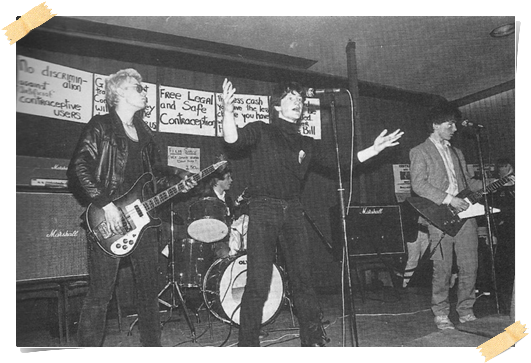
Nosso primeiro show juntos está gravado em minha mente, uma das noites mais emocionantes da minha vida. Éramos punk e ultrajantes. Mas o Feedback se transformou em Hype e eu me lembro de ficar tão impressionado com a maneira como o som deles estava se expandindo e como Bono estava tomando conta do palco. Acho que pode ter sido a primeira noite em que tocaram "Street Missions" (uma música que eles nunca gravaram) e parecia épico. Também me lembro da aparição de Paul McGuinness pela primeira vez, como empresário da banda, antes de um show. Ele foi muito desdenhoso de nós e nos considerou um pouco incômodos, dizendo que só poderíamos fazer três músicas, embora tivéssemos meia hora de set. E, de fato, ele desligou a gente depois daquelas três músicas, com pressa para colocar sua banda no palco, provavelmente antes de expulsarmos o público.
O quão diferente era U2 em relação às outras bandas da época? Você via potencial para se tornarem uma das grandes bandas?
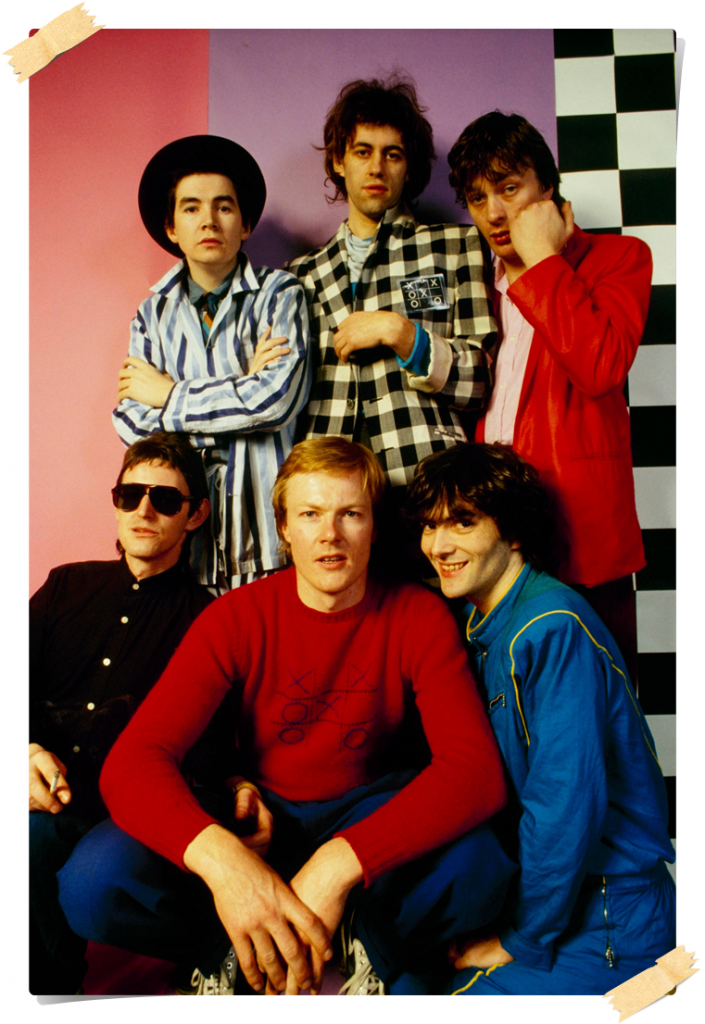
Eu acreditava no U2 completamente, mas você tem que ter em mente que eu não conhecia nada melhor. Eu costumava ir vê-los o tempo todo e vi o progresso em uma banda de rock quente, o brilho explosivo de Edge como guitarrista e o desenvolvimento carismático de Bono como cantor. Tive sorte de estar lá. Mas eu não tinha nada com o que realmente comparar. Eu era tão ingênuo e apaixonado pelo rock, gostava de todas as bandas que via naquela época. Eu não sei se eu era capaz de dizer a diferença entre uma banda boa e uma porcaria, tudo me parecia inebriante. Mas eu vi The Ramones, The Buzzcocks, The Jam, The Clash, Elvis Costello & The Attractions, Ian Dury e os Blockheads e os heróis do punk irlandês The Boomtown Rats, e acho que entendi que eles estavam em outro patamar para o U2 na época. Mas o U2 era minha banda, eu conhecia todas as músicas do set deles, conhecia todas as pessoas da banda e do público, então esses shows eram os que importavam para mim. Eu acho que eles se tornaram bons muito rapidamente. E que, na cena local, eles se destacaram muito rapidamente pela originalidade e intenção.
Você poderia compartilhar conosco algumas curiosidades daquela sessão de fotos de Bono para a capa da Hot Press em que ele segura uma revista em chamas?
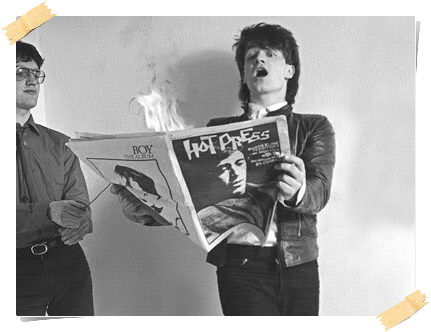
Eu era designer gráfico na Hot Press na época. Estávamos lançando a revista na Inglaterra e foi decidido fazer uma campanha de pôsteres com Bono, vocalista da banda mais quente da Irlanda. Eu vim com o conceito e arranjei o ensaio. Colm Henry era o fotógrafo, e tiramos a foto em seu apartamento no porão, onde ele pintou as paredes de branco para que pudesse usá-lo como estúdio. Eu tinha um cabide com um acendedor de fogo acoplado, coloquei fogo nele e fiquei ao lado dele, segurando o cabide de forma que parecia que a chama estava saindo da capa da Hot Press. Eu gostaria de ter um daqueles pôsteres agora. A namorada de Bono, Ali, estava conosco, incrivelmente linda e sempre muito calorosa e especial, e há uma linda foto deles tirada na mesma sessão, provavelmente a primeira grande foto deles como um casal. Então acho que Ali tinha um carro, dirigimos até o centro da cidade de Dublin e nós três saímos para jantar. E Bono falou sobre conquistar o mundo e fazer um álbum tão bom quanto o "Sergeant Pepper" [dos Beatles] um dia.
Você acredita que o passado dos membros do U2 influenciou som e os resultados no "Boy"? Como era ser um adolescente na Irlanda naquela época?
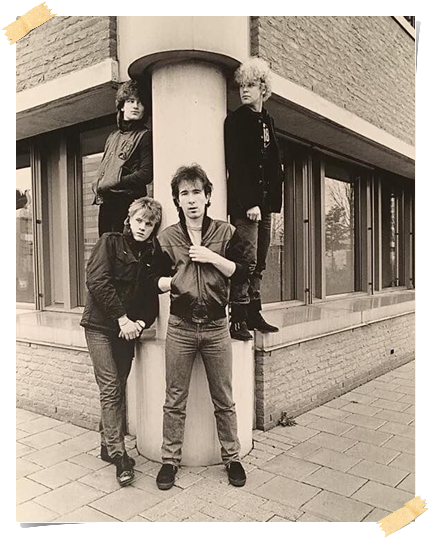
Somos todos criados pelo nosso passado. O rock é o som da interação de personalidades. Apenas aquelas quatro pessoas, com seus quatro personagens e jornadas únicas, poderiam fazer o som que viria a se tornar o U2. A perda de sua mãe por Bono e a perda de sua mãe por Larry foram particularmente forças motrizes, uma perda que você não desejaria a ninguém, mas que incutiu em ambos algo intenso e carente que só podiam expressar através da música. Quanto a ser um adolescente na Irlanda... era um país repressivo, com muitas atitudes retrógradas, contra as quais tivemos que chutar. Mas a rebelião é um presente para adolescentes irados. Lembro-me daquela época com muito carinho. Nós nos divertimos muito e sentimos que estávamos mudando o país. Acredito que nossa geração mudou a Irlanda, abrindo-a para atitudes mais liberais.
De qual show do começo do U2 você guarda as melhores memórias? Você vê alguma coisa daqueles adolescentes no palco hoje? Eles ainda carregam algo daquela época?
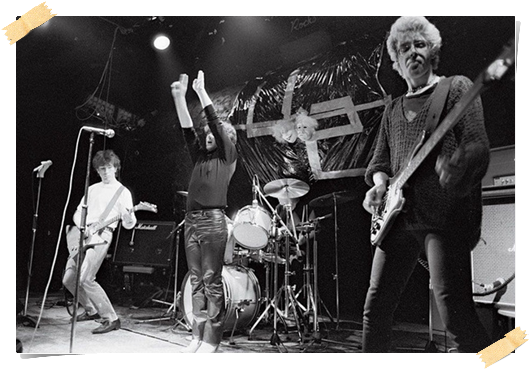
Lembro-me de todos eles, desde bares de hotéis, salões de igrejas e centros comunitários a pubs, clubes e salões de baile. Eu adorei os shows no McGonagles, onde às vezes nós abrimos estes shows, e onde eles tentaram muitas experiências de rock art. E eu me lembro de um dia estar na primeira fila da Wembley Arena em Londres, vendo meus colegas de escola no palco, e me sentindo como se fosse exatamente o mesmo que era no ginásio da escola, apenas quatro pessoas, expressando-se na alegria e o poder da música rock elétrica.
A banda se tornou uma das maiores bandas de todos os tempos, e para isso ocorrer tiveram mudanças de comportamento e de sonoridade, ou seja, o quão diferente é o U2 para você dos anos 80 para hoje?
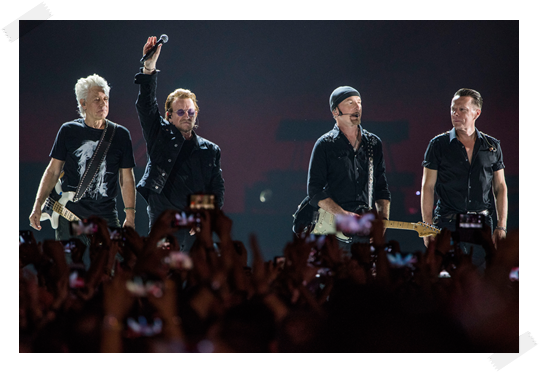
Obviamente muito diferente. Mas também sou diferente como ouvinte. O U2 do "Boy" e "October" é a banda que formou um som ao meu redor quando eu era jovem, e sempre terá um poder especial para mim. A maneira como eles chegaram a algo mais áspero e profundo em "Joshua Tree" e "Rattle and Hum" é extraordinária, e aquela era foi incrível, tão emocionante ao vivo. Mas eu amo "Achtung Baby" e o U2 irônico dos anos 90, quando tudo ficou um pouco mais complexo, interessante e musicalmente pop. Estou sempre aberto para o que eles fazem. Eles mudaram como pessoas de maneiras que a idade adulta e o sucesso e as vitórias e perdas e as esposas e filhos mudam você, mas é a mesma personalidade essencial guiando a música. O último álbum, "Songs Of Experience", foi uma coisa linda.
Poucas bandas mantêm a mesma formação por tanto tempo. Na sua opinião, o que os fazem estarem juntos há tanto tempo e ainda continuarem no topo?
Decidir desde o início que eles iriam compartilhar tudo, isso foi crucial. A disparidade de riqueza é o que divide a maioria das bandas. A fé deles era importante, pois os impedia de entrar em áreas de excesso e corrupção da alma que arruinaram tantas bandas. A fé também manteve os egos sob controle. A qualidade de lealdade que existe em todos eles é fundamental. A percepção de que eles eram mais fortes juntos do que separados. Mais grupos precisam perceber isso. Eles provavelmente tiveram sorte por não terem nenhum babaca declarado na banda.
O quão desafiador foi escrever o livro "U2 by U2"?
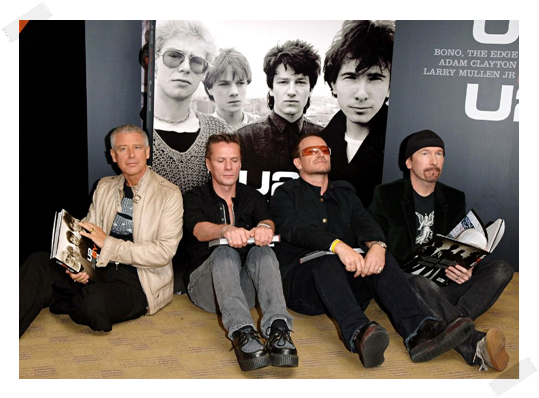
Foi um prazer fazer isso, e passar tanto tempo com o U2, conversando muito com eles e sendo capaz de fazer todas as perguntas que alguém gostaria de fazer. Como éramos amigos antes, parecia natural e era fácil para eles serem honestos comigo. O desafio veio reunir todo esse material em um livro que satisfez a todos os membros. Nos estágios finais, foi como produzir um disco, com muitas mudanças sendo solicitadas em quatro ângulos diferentes e com um foco implacável nos detalhes, e nos exauríamos e enlouquecemos, tudo em busca da excelência. Deu muito trabalho. Bono me disse depois que eu agora era um membro exclusivo de um clube, como os produtores do U2, que sabem como é realmente difícil criar o produto final do U2. E então você desaparece no fundo e deixa a banda levar o crédito. Porque é, afinal, a história deles, a arte deles. Estou muito orgulhoso desse livro.
Você tem acompanhado a banda já por mais de quatro décadas. O que você espera deles para o futuro, acredita que o U2 terá um fim, uma pausa, vão diminuir o ritmo ou a falta do palco para eles é impensável?
Espero mais grandes trabalhos no futuro, talvez um pouco menos do que no passado. Mas eu não acho que eles irão acabar, porque a música é quem eles são e o que eles fazem, e eles sabem que fazem isso melhor juntos. Eles são amigos. Que alegria poder fazer música com seus amigos. Por que alguém iria querer desistir disso?
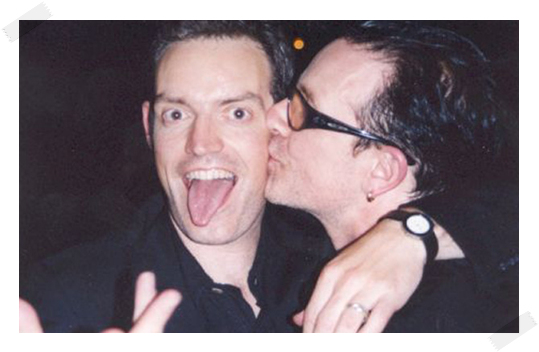
No seu livro "Killing Bono" você debateu com on Bono sobre a fé. Você ainda conversa sobre fé e espiritualidade com o Bono? Acha que a fé do Bono mudou ao longo do tempo? O que mudou?
Não muito. Ocasionalmente, isso surge. Muitas dessas conversas aconteceram quando éramos mais jovens, formando nossas ideias de mundo. A fé de Bono mudou com o tempo, minha falta de fé mudou com o tempo também. Mas nenhum de nós acha que ele vai converter o outro.
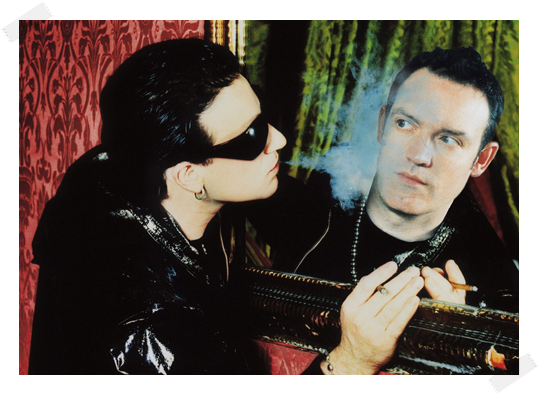
O subtítulo de "Killing Bono", "I was Bono Doppelgänger", você realmente queria ser seu doppelgänger (sósia) ou prefere ser de outra pessoa?
Foi só uma piadinha que realmente foi longe demais. Senti que ele tinha vivido a vida que sonhei para mim, mas sempre vi o humor nessa ideia. Eu realmente não quero ser a sombra de ninguém. Eu tenho minha própria vida, meus próprios amores, meus próprios filhos, e não os desistiria por ninguém.
Seu último livro “Zero” foi lançado por meio de doações e contou com a ajuda de muitos fãs do U2 que acompanham sua carreira. Quão importante é a comunidade U2 no seu trabalho hoje? Envie-lhes uma mensagem.

Os fãs do U2 se sentem como uma comunidade e tendem a ser pessoas muito atenciosas e interessadas no mundo. Eu realmente nunca conheci um fã do U2 de quem não gostasse, o que é incrível. Sou grato por qualquer interesse que eles tiveram em meu trabalho. Para ser honesto, provavelmente sou muito menos obcecado pelo U2 do que a maioria dos fãs do U2, porque eles eram apenas parte da minha vida, como história, como família, enquanto outros os procuraram por conta própria. Quanto à mensagem, um amigo meu disse melhor: Somos um, mas não somos os mesmos. Nós podemos carregar um ao outro.
A equipe do U2BR gostaria de agradecer a gentileza de Neil por aceitar nosso convite e conceder um pouco do seu tempo para falar conosco. Nosso muito obrigado, Neil!
ENGLISH VERSION
If some U2 fans were asked if they wish they could switch places for a period of time, with someone who is part of the band's history, the name chosen by many of them to be the victim to this adventure would be Neil McCormick.
Neil was born in England in August 1961. As a child, he moved with his parents to Scotland and later in his early teens, together with them and his brothers - Ivan and Stella - they moved to the Irish capital, Dublin.
The McCormick brothers were enrolled by their parents in the school that until then had the most progressive vision within Irish society: Mount Temple Comprehensive School, where there were many other students who like them, were passionate about music. As many of you already know, on the notice board of the school there was a certain advertisement from a student who wanted to start a band. He had the drums, the will, and the talent, but he needed the rest.
Ivan joined the boys who attended the kitchen in the Artane neighborhood, home to Larry Mullen and his family. Also present were Ivan and the boy who owned the house, Paul David Hewson (who was Neil's classmate), David and Dick Evans, Adam Charles Clayton (who was Stellla McCormick's classmate) and Peter Martin.
Ivan joined the band, Stella was invited to participate as a backing vocal in the first two performances of the group, which was named “Feedback”. However, only after just two months he ended up being released on a call by Adam Clayton, who said he wasn’t old enough to enter the pub where the band would play one of their first shows. He was only 13 years old.
Two years later, the McCormick brothers started their own band called “Frankie Corpse & The Undertakers”, which later changed their name to “The Modulators”. At the same time, Neil became a member of the team responsible for the legendary and very important Hot Press magazine that was responsible for moving the entire music scene in the Irish capital, highlighting local names and also coming from other parts of the world. Neil was able to see his school friends become U2 and appear on its cover just a few years after his brother's withdrawal.
However, his own rockstar dream remained alive and came very close to becoming true. After the two bands mentioned above and also “Yeah! Yeah !”, Neil and Ivan managed to sign a contract with a record label and release their first single, now named as “Shook Up!”. The band lasted from 1985 to 1988, until Neil ended up realizing that in reality his big role in the music scene was backstage and he started to dedicate himself entirely to music journalism.
The friendship with his famous friends remained throughout Neil's comings and goings. He saw U2 become the greatest band on the planet in the late 80s, he saw the changes of direction in the 90s, he saw Bono facing struggles for social rights, marriages and births, remaining as a true eyewitness, a confessor, a counselor and an attentive listener.
In 2004, already as a successful critic in The Daily Telegraph, after passing through the British magazine GQ, Neil released a solo album "Mortal Coil", under the pseudonym The Ghost Who Walks. But this was definitely not the most famous work he did that year. The book “Killing Bono” arrived in bookstores in a very good-natured way, telling Neil's entire life as an “impostor”, someone who wanted to have lived the life Bono had until that moment. A very light, fun and full of small details about U2's past, but especially about the life of someone who like many of us, grew up in love with the world of music, concerned with “what I will be when I grow up” and with friends who sometimes seem to have a much better life than yours. In 2011, the book hit the cinema screens, with a movie of the same title. Ivan, the dismissed brother, was responsible for the soundtrack. More recently, in 2018, the work hit the theater in Soho, London.
In 2006, the time of celebrating U2's 30-year career, Neil was responsible for writing the biography of the band named “U2 by U2”. A real encyclopedia for fans of the band, especially those who wanted to know the steps that had brought the Irish up to that moment.
In 2017, Neil released his first fictional novel “Zero”, which was made through collective funding. The book once again has the music scene as a background, presenting a character involved within this current reality that deals with culture in several different media, and more of a product than really a lifestyle as it was in the adolescence and youth of the author.
Neil currently remains part of The Telegraph's culture team, and also a frequent guest in partnerships with the British BBC.
We spoke to Neil for another interview that is part of our special Boy’s 40th anniversary. In our chat, Neil told us about his memories of the early days of U2, the first shows, curiosities, reflections on music and his work. Check it out below!
Were you at any of the band's first rehearsals in the 70's? What were they like?
I was around rehearsals, a little bit. I don’t remember much about them, except being impressed with the sense of noise and purpose coming from the music room. It was decorated with orange carpet tiles, I seem to recall. My brother Ivan was in those first rehearsals, and he remembers an interesting incident of Bono (or Paul Hewson as he was then) going around encouraging everyone’s playing as if almost trying to suck the music out of their instruments. So nothing much has changed there.
What are your memories of the first U2 concert as Feedback at Mount Temple?
It blew my tiny teenage mind. I’ve written about this many times. It was a big gymnasium, where we were having a kind of talent contest. I was doing a comedy play I had written with some of my friends about our teachers. We were supposed to go on last. Feedback went on before us, playing on a stage made of four tables taped together. They looked great. It was just the four of them, the same line up as U2 now. They kicked into Peter Frampton’s Show Me The Way and it was a life changing moment, for them … and for me. That opening electric power chord by Edge just rocketed around the room, the band kicked in and history was made. I remember Bono had an acoustic guitar but he stopped even trying to pretend to play it, instead he picked up the mike stand and stomped about the stage in his pointy boots yelling “I want you … show me the way!” There were young schoolgirls in the room who, like most of the rest of us, had never seen a live rock band before. They ran to the edge of the stage and started screaming and yelling and just acting the part of hysterical fandom as we’d witnessed on TV. It was incredibly exciting. They played three songs, including teen boy band Bay City Rollers hit Bye Bye Baby, and maybe played one of them again cause the kids were screaming so much. I was so overwhelmed, I refused to go on and do our play. I pretty much resolved to form my own band that very moment.
Why did you and your brother decide to start a band at the time? How was the relationship with the U2?
Music was always a big part of our lives at home. Ivan played guitar and had been involved in the early Feedback rehearsals. I wanted to be an actor, but after I saw U2 I decided I’d be a rock star instead. Teenage stuff. Our relationship with U2 was very friendly. They were encouraging and Bono was a bit of a mentor to us, and became a good friend to me around that period through our shared obsession with music, and particularly the beginnings of punk. It was considered so outrageous in Ireland, and there were only a few of us who were into it. Bono is about a year older than me, Larry is a year younger, and those age differences count for a lot as teens. I looked up to one and down on the other! Dave was a friend from class. Adam was a bit more distant, because he had his own cool thing going on. But essentially we were all teenagers obsessed with music, and a type of music that was frowned upon by society, which was a powerful bonding thing between us all.
Do you have any story behind the scenes of the shows you opened for them to share with us?
Our first gig together is burned in my mind, one of the most exciting nights of my life. We were punky and outrageous. But Feedback had turned into the Hype and I remember being so impressed by the way their sound was expanding and the way Bono was taking over the stage. I think it may have been the first night they played Street Missions (a song they never recorded) and it seemed epic. I also remember the appearance of Paul McGuinness for the first time, as the band’s manager, before a gig. He was very dismissive of us, and considered us a bit of a nuisance, telling us we could only do three songs though we had a half hour set. And, indeed, he pulled the plug on us after those three songs, in a hurry to get his band onstage, presumably before we chased the audience away.
How different was U2 in relation to the other bands of that time? Did you see the potential to become one of the greatest bands?
I believed in U2 completely, but you have to bear in mind I didn’t know any better. I used to go and see them all the time, and I saw their progress into a white hot rock band, Edge’s explosive brilliance as a guitarist, and Bono’s charismatic development as a front man. I was lucky to be there. But I had nothing to compare it with really. I was so naïve, and so in love with rock music, I liked all the bands I used to see then. I don’t know if I was capable of telling the difference between a good band and a rubbish one, it all seemed intoxicating to me. But I saw The Ramones, The Buzzcocks, The Jam, The Clash, Elvis Costello & The Attractions, Ian Dury and the Blockheads and Irish punk heroes The Boomtown Rats, and I guess I understood that they were on another plane to U2 at the time. But U2 were my band, I knew all the songs in their set, I knew all the people in the band and in the audience, so those gigs were the ones that mattered to me. I do think they became good very quickly. And that, on the local scene, they bypassed the other Irish bands very quickly through originality and intent.
Could you share with us some stories from that photo shoot by Bono for the cover of the Hot Press where he holds the burning magazine?
I was graphic designer at Hot Press by then. We were launching the magazine in England and it was decided to do a poster campaign with Bono, frontman of Ireland’s hottest band. I came up with the concept and set up the shoot. Colm Henry was the photographer, and we took the picture in his basement flat, where he had painted walls white so that he could use it as a studio. I had a coat hanger with a firelighter attached, and I set fire to it and stood beside him, holding the hanger so that it looked like the flame was emerging from the cover of Hot Press. I wish I had one of those posters now. Bono’s girlfriend Ali was with us, incredibly beautiful and always very warm and special, and there’s a lovely picture of them taken at the same session, probably the first great picture of them as a couple. Then I think Ali had a car, and we drove into the city centre of Dublin, and the three of us went out to dinner. And Bono talked about taking over the world and making an album as great as Sergeant Pepper one day.
Do you believe that the past of U2 members influenced their sound and the results received at Boy? What was it like to be a teenager in Ireland at that time?
We are all created by our past. Rock music is the sound of personalities interacting. Only those four people, with their four unique characters and journeys, could make the sound that was to become U2. Bono’s loss of his mother and Larry’s loss of his mother were particularly driving forces, a loss you wouldn’t wish upon anyone, but one that instilled both of them with something intense and needy they could only express through music. As for being a teen in Ireland … it was a repressive country, with a lot of very backward attitudes, that we had to kick against. But rebellion is a gift to angry teenagers. I remember the time very warmly. We had a lot of fun, and we felt like we were changing the country. I believe our generation did change Ireland, opening it up to more liberal attitudes.
Which of the shows from the beginning of U2 do you have the best memories of? Do you see anything of those kids on the stage today? Do they still carry something from that time?
I remember them all, from Hotel bars, church halls and community centres to pubs and clubs and ballrooms. I loved the shows at McGonagles, where we sometimes supported them, and where they tried a lot art rock experimentation. And I remember one day being in the front row at Wembley Arena in London, watching my school mates on stage, and feeling like it was exactly the same as it had been back in the school gymnasium, just four people, expressing themselves in the joy and power of electric rock music.
The band has become one of the greatest bands of all time, and for that to happen there were changes in behavior and sound, that is, how different is U2 for you from the 80's to today?
Obviously hugely different. But I am also different as a listener. The U2 of Boy and October is the band that formed their sound around me when I was young, and it will always have a special power to me. The way they came into something rougher and deeper on Joshua Tree and Rattle and Hum is extraordinary, and that era was amazing, just so thrilling live. But I love Achtung Baby and the ironic U2 of the nineties, when it all got a bit more complex and interesting and poppier musically. I’m always open to what they do. They have changed as people in ways that adulthood and success and wins and losses and wives and children change you, but it is the same essential personality guiding the music. The last album, Songs of Experience, was a beautiful thing.
Few bands keep the same formation for so long. In your opinion, what makes them be together for so long and still remain at the top?
Deciding early on that they were going to share everything, that was crucial. Wealth disparity is what splits most bands. Their faith was important, cos it stopped them going into areas of excess and corruption of the soul that ruin so many bands. Faith also kept egos in check. A quality of loyalty that exists in all of them is a key thing. The realisation that they were stronger together than apart. More groups need to realise this. They were probably lucky that they had no out and out arseholes in the band.
How challenging was it to write the “U2 by U2” book?
It was a pleasure to do it, and to get to spend so much quality time hanging out with U2, and talking to them extensively, and really being able to ask every question anyone would want to ask. Because we were friends before, it felt natural, and it was easy for them to be honest with me. The challenge came assembling all of that material into a book that satisfied all of the members. In the final stages, it became like producing a record, with lots of changes being requested from four different angles and with a relentless focus on detail, and we exhausted each other and drove each other mad, all in pursuit of excellence. It was a lot of work. Bono told me afterwards I was now an exclusive member of a club, like the producers of U2, who know how hard it really is to create U2’s finished product. And then you fade into the background and let the band take the credit. Because it is, after all, their story, their art. I’m very proud of that book.
You have followed the band for more than four decades. What do you expect from them for the future? Do you believe that U2 will come to an end, a break, will slow down or to be off stages for them is unthinkable?
I expect more great work in the future, maybe a bit less of it than there has been in the past. But I don’t think they will end, because music is who they are and what they do, and they know they do it better together. They are friends. What a joy to be able to make music with your friends. Why would anyone want to give that up?
In your book “Killing Bono” you debated with Bono about faith. Do you still talk about faith and spirituality with him? Do you think Bono's faith has changed over time? What has changed?
Not so much. Occasionally it comes up. A lot of those conversations took place when we were younger, forming our ideas of the world. Bono’s faith has changed over time, my lack of faith has changed over time too. But neither of us thinks he’s going to convert the other.
The subtitle of Killing Bono, "I was Bono Doppelgänger", did you really want to be his doppelgänger or would you rather be someone else's?
It was just a little joke that has really gone too far. I felt he had lived the life that I had dreamed for myself, but I always saw the humour in that idea. I really don’t want to be anyone’s shadow self. I have my own life, my own loves, my own children, and I wouldn’t give them up for anyone else’s.
Your last book “Zero” was through crowdfunding and had the help of many U2 fans who follow your career. How important is the U2 community in your work today? Send them a message.
U2’s fans do feel like a community, and they tend to be very caring people, interested in the world. I’ve genuinely never met a U2 fan I didn’t like, which is quite something. I’m grateful for any interest they have had in my work. To be honest, I’m probably much less obsessed with U2 than most U2 fans, because they were just part of my life, like history, like family, whereas others have sought them out for themselves. As for a message, a friend of mine said it best: We are one but we’re not the same. We get to carry each other.
The U2BR staff would like to thank Neil for his kindness in accepting our invitation and giving a bit of his time to answer our questions. Thank you very much, Neil!
